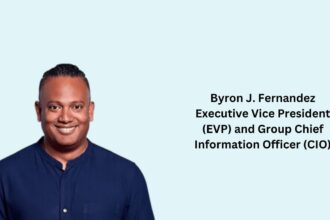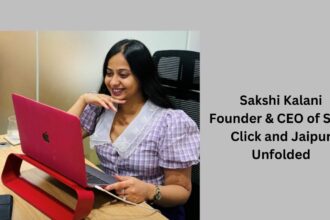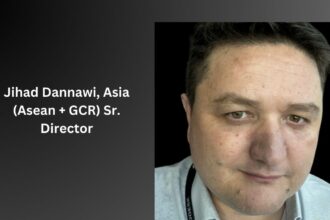Yes, the one from Cooking with Paris. No, not in the metaverse. Not yetanyway.

Last fall, I had spent a month co-living and co-working with two dozen or so creators and founders in a Beverly Hills mansion where Paris Hilton and Cardi B oncelived.
Its not a reality tvshow.
I say this every time I talk about my experience at Launch House, a start-up that recently raised a $12m Series-A led by Andreessen Horowitz.
What is LaunchHouse?
While this is not a promotional article, I think providing context can be helpful. If thats not your interest, feel free to skip to the next section. Launch House invites 1525 start-up founders and content creators (though now expanding the scope to engineers) in cohorts to come live and work together for a month. It felt like a start-up accelerator meets content house meets community. Cohorts can be general or theme-based, for example, fintech, metaverse, or web3. I was a part of a creator economy cohort. Like other accelerators, there are resources and communities to help members succeed. Its not a surprise that founders have done OnDeck.
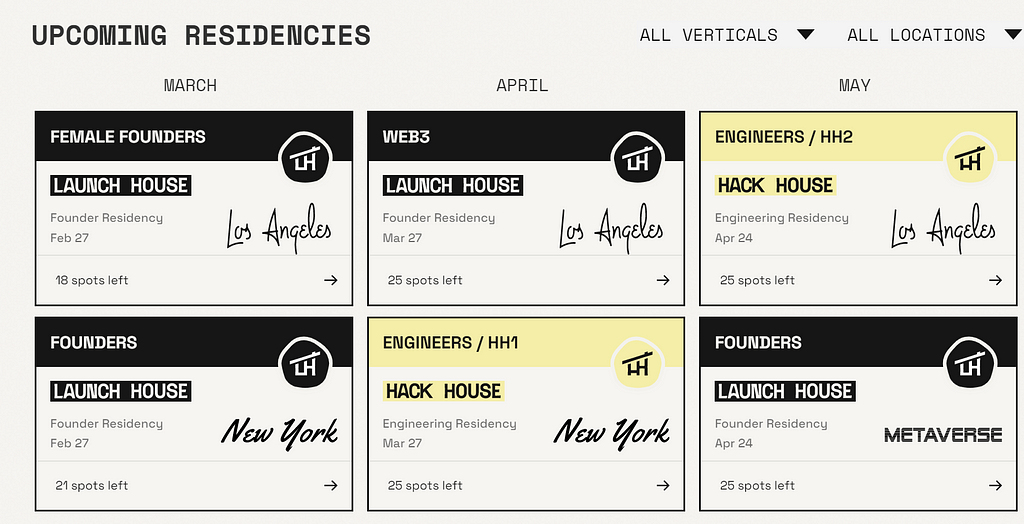
Based on my experience, the core themes of Launch House can probably be summarized into (1) launching something new and (2) building deep relationships. To accommodate this, mornings and afternoons are free for founders and creators to work, and evenings are filled with formal educational or community-building programming. These programs are often with established founders, investors, and creators like Justin Kan, Naval Ravikant, and AndrewChen.
To participate, the program charges $3,000 USD for 1-year membership along with a $2,500 live-in fee in both LA and NYC. You can pay more to have a larger bed or a room to yourself.
On a side note, there are several informal parties beyond formal structures. Every party in LA seems to have at least a few Launch House members. Its a great way to get integrated into thecity.
Be prepared to sacrifice sleep if you want to party AND work. Most people were sleep-deprived for themonth.
Does community matter?
Full disclosure, Im not an expert on community or community building. I make this clear, because I think people should stick to knowing what they talk about when giving guidance. Here, Im simply taking position of a recent member making observations about how some tools are used to create and maintain a good community. And as a result, itll based mostly on personal anecdotes, observations, and sometheory.
What prompted this piece is my perception that communities are becoming more important for founders and creators alike. I know that there are a few people outside of my founder communities like Y-Combinator and personal friends who can empathize deeply with running a start-up. Many creators seem to feel the same way. I think this sentiment and need for community extends to anyone taking less traditional paths in career and other parts of life. Even within traditional careers, there seems to be growing importance Chief Community Officers aswell.
Getting started.
Waking up to this view of LA in the bathroom every morning was definitely a blessing. And of course, there were real benefits from the program as well including meeting great founders and creators, which shortened my product feature iteration cycle to as short as 48 hours in some cases. But for this article, Ill focus on observations related to community.
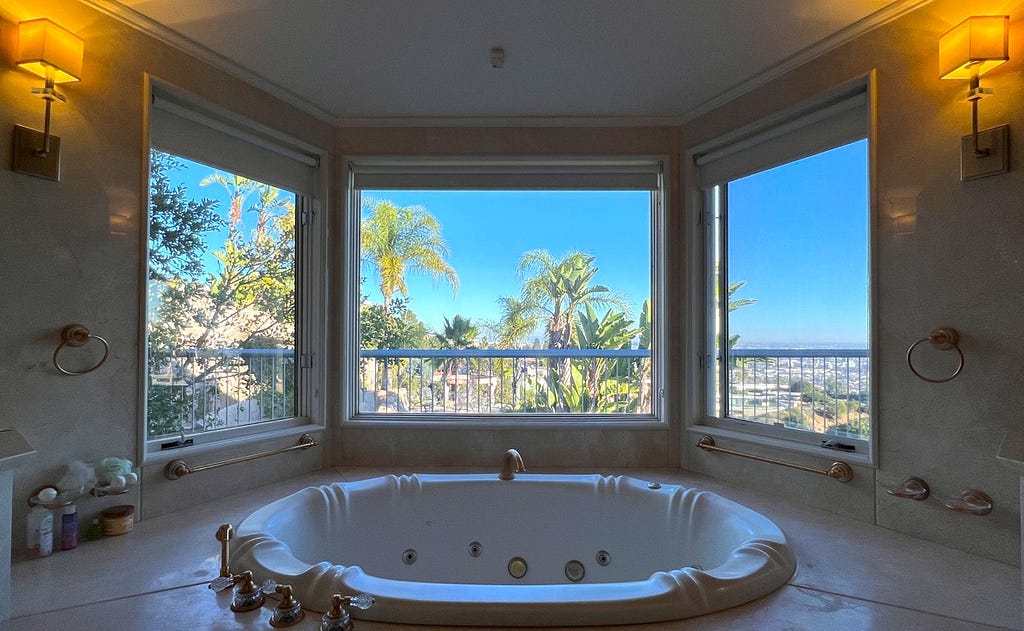
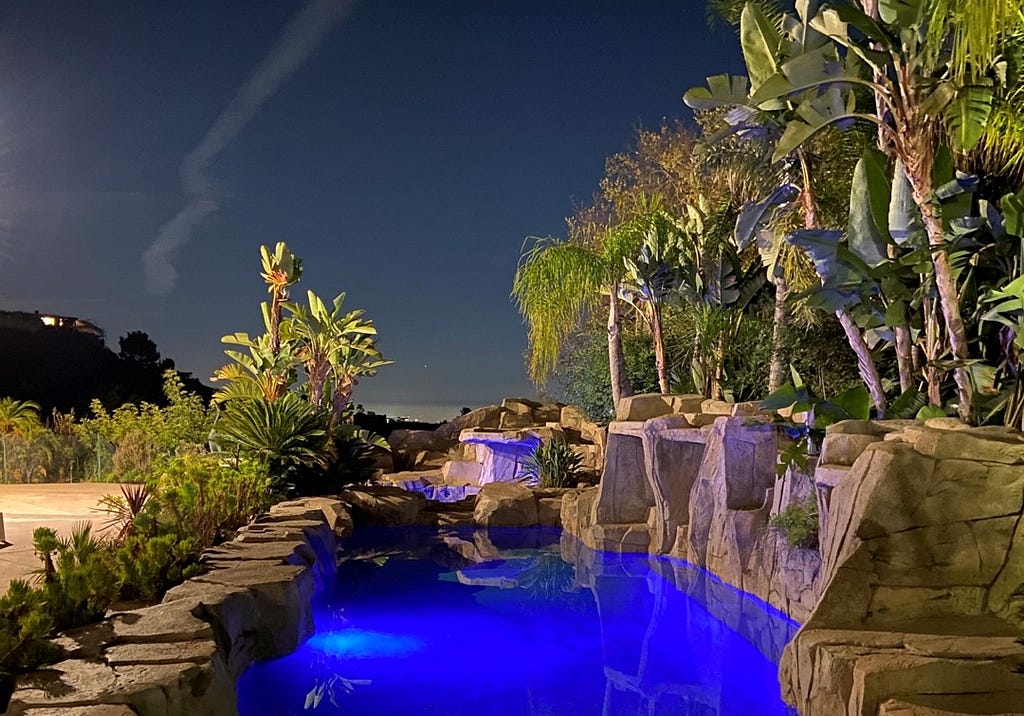
If youve been following my writing, youll know that I use mental models to make decisions. I iterate and update these mental models based on new experiences and observations. Theres probably endless analysis that could be done, but let me boil it down to answering two questions: vibes and relationships.
Vibes matter.
For a long time, I was a strong believer in substance over style. If the core value proposition was good, then people would come through. It turns out vibes matter a lot. Its themoat.
1. Why was it so easy to have people show up at LaunchHouse?
If youve tried planning an event or building a community, Im sure convincing people to attend and engage was not simple. And even more complex is having people of influence to reliably show up. Launch House did thiswell.
Lets imagine someone invited me to an event at an ordinary restaurant with interesting people, Id consider going??maybe, if I think it was worth my energy and time and my uber cost (its expensive inLA).
Vibes can influence people almost as much as people can influence vibes
Now imagine someone invited me to the same event, but at a mansion in Beverly Hills, with an open bar, with a squid games live show going on. Now Im interested. Now its more exclusive. Everyones thinking the same thing. This creates a virtuous cycle even more incentives and attractiveness.
And that was event in my first weekthere.
This line of reasoning seems to hold in theory as well. Academics try to describe cause-effect relationships in theories. One such theory on influencing people is by psychologists French and Raven, who talk about six primary forms in their research paper Bases of Social Power. To paraphrase crudely, they claim social power comes from the following:
- Expertise (I have expert knowledge)
- Legitimacy (I have moralgrounds)
- Incentives (I can make it worthwhile)
- Attractiveness (Im charming and respectable)
- Force (I canharm)
- Information (I have relevant information)
Creating the right vibes can encompass many of these social powers, and at the very least create greater incentives and attractiveness for people toengage.
At least one primary contributor to community is using vibes as source of influence
Relationships Matter.
Since college, Ive been to my fair share of networking parties and cocktail parties that ended up with a pile of business cards and Linkedin connections that collected dust. Yes, digital dust too. In contrast, Launch House seemed to have created a culture that facilitated mutually-beneficial social and professional relationships among community members and affiliates.
2. Why were there disproportionally high number of meaningful connections at LaunchHouse?
Going deep with relationships was a major component of Launch House. Tried-and-true methods of expectation setting and reinforcement of this value worked well. So unlike many networking events where the social understanding is to trade favors with one another, the social understanding here was not transactional. For example, I didnt know the professional background of some members until a week or two into living together. I didnt know who knewwho.
Its not a secret that personal relationships are richer than transactional ones, but its the execution that was done well. Even from my perspective, Im much more comfortable making introductions for a friend than a colleague.
Living with each other in-person and discouraging favors until relationship were built were probably meaningful differentiators that enabledthis.
The intuition here is corroborated by theory once more. In his book What Money Cant Buy, Michael Sandel refers to the study A Fine is a Price, which discusses the impact of transactional and non-transactional incentives at an Israeli daycare center. According to the authors Gneezy and Rustichini:
The deterrence hypothesis predicts that the introduction of a penalty that leaves everything else unchanged will reduce the occurrence of the behavior subject to thefine.
We present the result of a field study in a group of day-care centers that contradicts this prediction. Parents used to arrive late to collect their children, forcing a teacher to stay after closing time. We introduced a monetary fine for late-coming parents.
As a result, the number of late-coming parents increased significantly. After the fine was removed no reduction occurred.
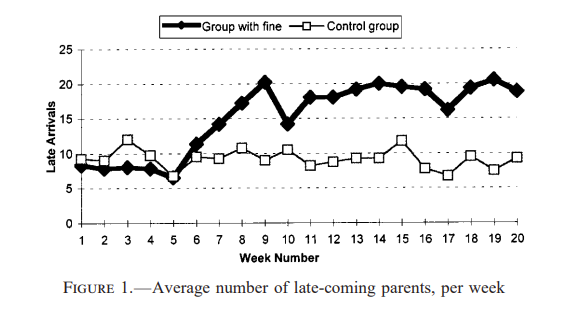
What Sandel gathers from this study is that character of incentives are different. Some can be more fragile, more sustainable, and perhaps even more admirable. He hypothesizes that transactional incentives may interrupt and replace non-transactional incentives. And once introduced, the non-transactional incentives, like community, may be weakened or disappear.
Coping as an introvert.
This probably deserves an entire piece on its own, but I wanted to share a fragment of my experience as an introvert.
Despite what personality tests tell me, Im an introvert. My problem is that I m social and love meeting people, but I need time to myself to recharge. During Launch House, I had my own place in LA and often retreated there for some alone time. Living with roommates in bunkbeds at the house didnt helpeither.
After dozens of events, I was reminded that its important to show up, but its also okay to spend time by myself withoutFOMO
Slowly, Im coming to terms with the fact that taking care of myself as an introvert can mean missing out. And thats okay. For example, the day after the cohort officially ended. I was physically and mentally spent after several social leading up to it. That morning, Serena Williams showed up to the house. I wasntthere.
A more personal example is when I missed Peter Hollens doing a surprise visit and talk because I was resting at home. As someone who did vocal jazz in the past, Peter Hollens was a big deal. Im happy to say that I ended up chatting with Peter one-on-one on a separate occasion about both acapella and the creator economy. But there wont always be occasion to get what I missed. Thats okay. Even if this didnt happen, Im learning to prioritize what I need and like (as an introvert) over what people say I ought to prioritize.
But I do think pushing myself to show-up is important to appreciate the seemingly ordinary, but meaningful experiences
A few nights before Halloween, there was a power outage at the house. I was at the house with a few other folks, and we ended up running around the house in masks and playing music together. When we got hungry, a few of us took an Uber to Mels (a supposedly 24-hour diner) only to find it closed. We walked a few blocks and had a late night snack at Saddle Ranch. The series of events here wasnt Serena Williams coming to the house. It wasnt a Instagramable story. In fact, the playlist at the restaurant was bad, and even the food wasnt great??Im not going back any way. But showing up let me have this fun experience and enjoyit.
Prioritizing alone time to take care of myself and pushing myself to show up may seem like contradictory forces. But I think the motivator is thesame.
Its getting to know myself and my motivations to make the rightcall
Showing up because of FOMO, anxiety, and social pressures is vastly different from motivation for self-improvement and professional courtesy. Being alone because of laziness, fear, and loneliness is vastly different from being alone for my mental health and enjoying my own presence.
Final caveats
Recovering from that tangent, I want to wrap up on a few practical notes.
First, recognize that Launch House is a start-up. I highlighted some great parts that relates to building community. But its strengths will need to be maintained and many more quirks worked out, especially with their growth. The good news is that founders are well aware of thisfact.
Second, even with that caveat some of you may want to join LaunchHouse.
Sharing some quick tips on the applications
- Get a referral. There are over 350 Launch House alumni to date. Many, if not most, are willing to help people out. Its also generally a good test. If you cant get a single member to spend 510 minutes and potentially provide a referral (with incentives to provide referrals), then iterating on your pitch as to why you should be a part of it might be a goodidea.
- Always be launching. As much as Launch House cares about socials, the core purpose is to be building and launching things. Having a track record of solving hard problems and launching things will be important. I dont think they want people who are coming in exclusively forsocials.
- Get the vibes. I visited Launch House and attended public events before applying. If you can, attend the physical and virtual events to get the vibes. You should be assessing if you likeit.
- Apply. I talked about the importance of taking shots in a previous article. Chances are probably much likelier than you may think.Apply.
Disclaimer: This website is not sponsored or endorsed by LaunchHouse
What I Learned About Start-ups & Creator Community Living at Paris Hiltons Old Mansion For a Month was originally published in Startup Stash on Medium, where people are continuing the conversation by highlighting and responding to this story.














